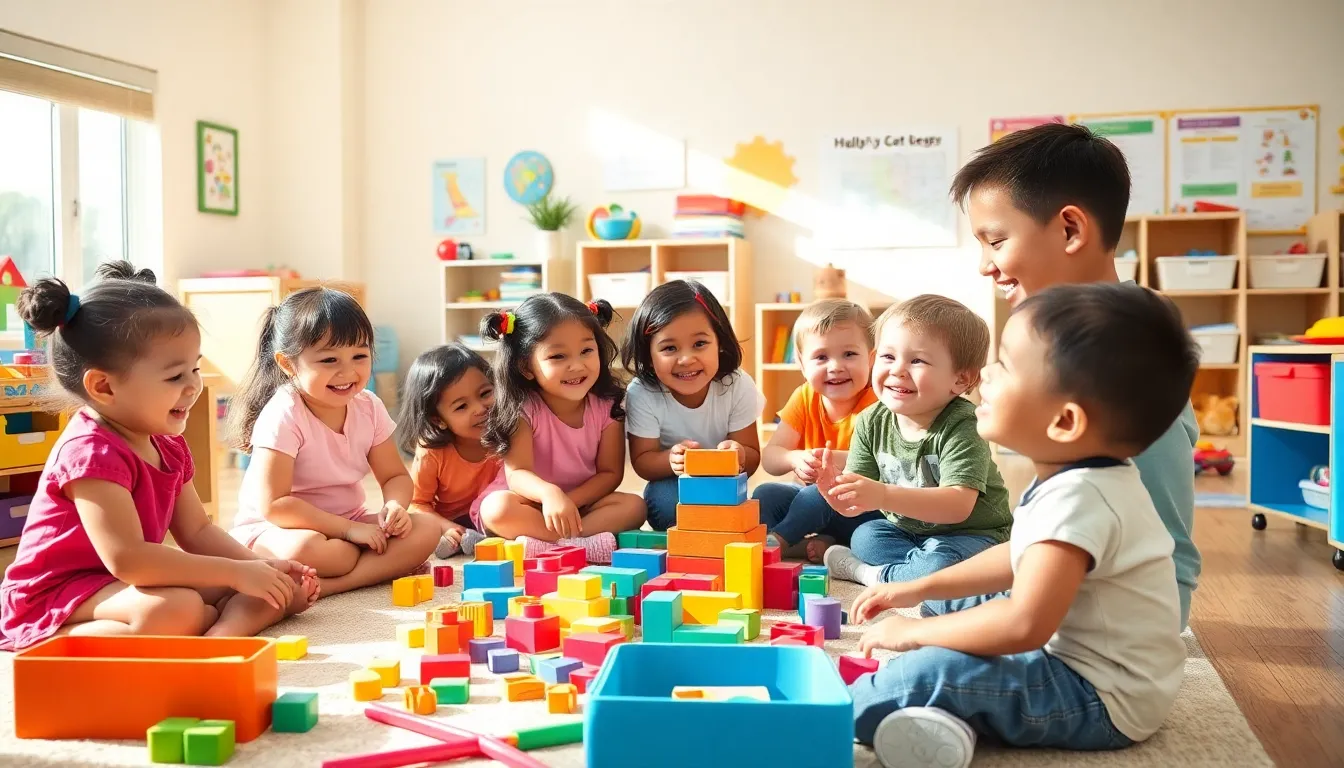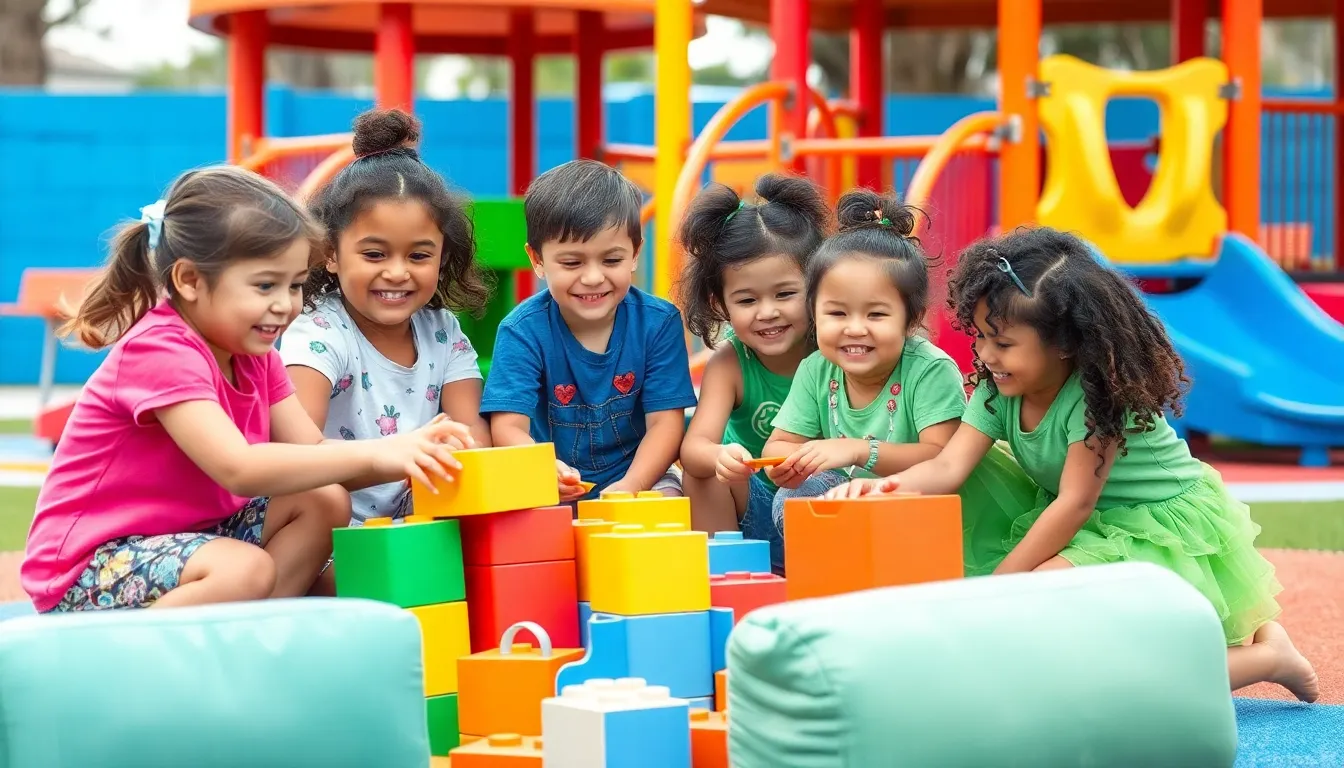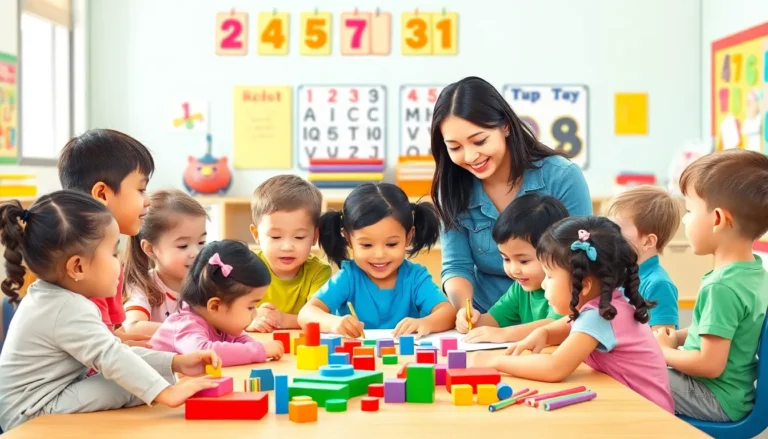Table of Contents
ToggleIn the sun-soaked paradise of Florida, where alligators sunbathe and oranges hang from trees, there’s another gem hidden in plain sight: the Florida Early Learning Standards. These guidelines aren’t just a set of rules; they’re the secret sauce for nurturing young minds and setting the stage for lifelong learning. Think of them as a roadmap guiding little explorers through the exciting world of education, ensuring they don’t just wander aimlessly like a tourist without a map.
Overview of Florida Early Learning Standards
Florida’s Early Learning Standards serve as a comprehensive framework designed to guide early childhood education. These standards outline essential developmental milestones for children from birth to age five. They promote various domains of learning, including social-emotional, physical, cognitive, and language development.
The standards emphasize the importance of play as a fundamental part of learning. Engaging in play-based activities helps strengthen critical thinking and problem-solving skills. Specific developmental objectives encourage interactions, encouraging children to explore their environment and engage with peers.
Stakeholders include educators, parents, and policymakers, all of whom benefit from understanding these guidelines. Educators utilize them to inform lesson planning and ensure age-appropriate practices. Parents gain insights into developmental expectations, enabling them to support their children’s growth effectively. Policymakers leverage data from these standards to shape funding and resources for early education.
Assessment methods align with the standards, providing metrics for evaluating children’s progress. Teachers collect observations, conduct assessments, and document evidence of skill acquisition. This data informs instructional strategies tailored to individual children’s needs, ensuring that all children receive the attention necessary to thrive.
Continuous improvement of the Florida Early Learning Standards occurs through periodic reviews and updates, reflecting current research and best practices in early childhood education. By staying relevant, these standards maintain their effectiveness in fostering a rich learning environment.
Importance of Early Learning Standards

Early learning standards play a crucial role in guiding childhood education in Florida. These standards ensure a framework that nurtures young children’s holistic development.
Developmental Benefits
Developmental benefits stem from a well-structured approach to early learning. Children ages birth to five receive support across several domains, including social-emotional, cognitive, and physical development. Fostering these areas helps build a solid foundation for future learning experiences. Engaging in play-based activities promotes skills such as critical thinking and problem-solving. As children interact with their surroundings, they develop essential abilities that serve them throughout their education. In turn, these experiences contribute to a more well-rounded development, preparing children for academic success.
Alignment with Educational Goals
Alignment with educational goals occurs when early learning standards inform curriculum and teaching practices. Educators rely on these standards to design age-appropriate lesson plans that address the needs of all learners. This alignment ensures that educational objectives are met while meeting developmental expectations. Parents gain insights from these standards, allowing them to understand what their children should achieve at specific ages. Policymakers utilize data derived from these standards to allocate resources effectively. By emphasizing these goals, Florida sets a framework that enhances early childhood education throughout the state.
Key Components of Florida Early Learning Standards
Florida Early Learning Standards encompass specific elements that promote child development and educational success. These components ensure children from birth to age five receive a strong foundation in learning.
Learning Domains
Learning domains cover essential areas of development, including social-emotional, physical, cognitive, and language growth. Each domain plays a vital role in shaping well-rounded children. Social-emotional development focuses on nurturing relationships and emotional regulation. Physical development emphasizes fine and gross motor skills through interactive play. Cognitive growth encourages problem-solving and critical thinking. Language development fosters communication skills through rich verbal interactions. A balanced approach to these domains supports holistic child development.
Instructional Approaches
Instructional approaches adopt various strategies to engage young learners. Play-based learning serves as a core method, enabling children to explore their surroundings. Hands-on activities encourage active participation, promoting creativity and curiosity. Differentiated instruction addresses individual learning needs, ensuring all children progress at their own pace. Teachers use observation and assessments to tailor lesson plans effectively. Intentional teaching builds on children’s interests, enhancing motivation and engagement. These approaches align with the Florida Early Learning Standards, facilitating meaningful learning experiences.
Implementation Strategies
Effective implementation of the Florida Early Learning Standards relies on targeted strategies across the educational landscape. Training educators and providing resources for parents plays a crucial role in this process.
Training for Educators
Educators benefit from professional development tailored to the Florida Early Learning Standards. Workshops cover key instructional strategies such as play-based learning, hands-on activities, and differentiated instruction. Regular training sessions equip teachers with the latest research and best practices. Furthermore, collaboration among educators fosters a community of shared knowledge and support. Mentoring initiatives connect experienced teachers with novices, ensuring consistent application of the standards. Continuous learning keeps educators informed about developmental milestones and teaching techniques that enhance student engagement.
Resources for Parents
Parents play an essential role in children’s education and benefit from resources linked to the Florida Early Learning Standards. Educational workshops provide insights into developmental expectations and ways to support learning at home. Access to online platforms offers a wealth of materials, including activity guides, videos, and assessment tools. Additionally, community engagement initiatives encourage parents to participate in school activities. Resource centers supply educational kits that promote play-based learning and developmentally appropriate practices. These initiatives empower parents to actively contribute to their children’s growth and align efforts with educators.
Challenges in Adopting Florida Early Learning Standards
Adopting the Florida Early Learning Standards presents several challenges for stakeholders involved in early childhood education.
Common Misconceptions
Many people confuse the Florida Early Learning Standards with rigid curricula. The standards instead provide a flexible framework that encourages creativity and exploration. Parents and educators often believe that achieving every milestone requires a linear approach. This misconception can hinder children’s natural learning processes. Misunderstanding the role of play as a critical component of learning also poses challenges. Some may think that play lacks educational value, but it’s essential for developing cognitive and social skills. Addressing these misconceptions through effective communication and education is vital for successful implementation.
Support Systems
Establishing robust support systems is crucial for overcoming challenges in adopting the Florida Early Learning Standards. Professional development opportunities for educators enhance their understanding of the standards and improve instructional strategies. Access to resources, such as online materials and training workshops, empowers educators to incorporate the standards effectively into their teaching practices. Parent engagement initiatives also play a significant role in fostering a supportive learning environment. Workshops informing parents about child development and the standards equip them to reinforce learning at home. Collaborations with community organizations can enhance resource availability and provide additional support for children and families.
The Florida Early Learning Standards play a crucial role in shaping early childhood education across the state. By providing a structured framework that focuses on holistic development, these standards ensure children receive the support they need to thrive.
Through play-based learning and tailored instructional strategies, educators can foster an engaging environment that promotes critical thinking and problem-solving skills.
For parents and policymakers, understanding these standards is vital for supporting children’s growth and enhancing educational resources.
As Florida continues to refine these guidelines, the commitment to nurturing young minds remains steadfast, laying a strong foundation for future learning experiences.





